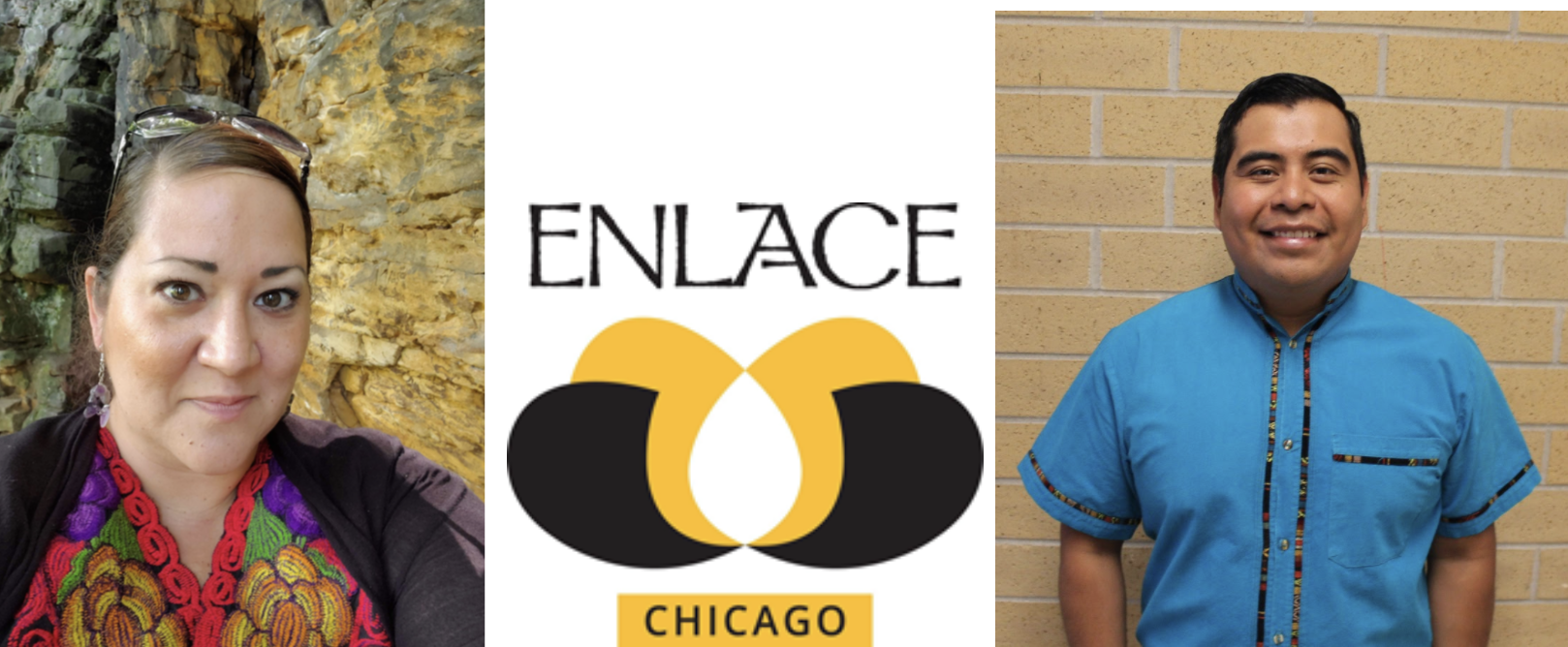
¡Hola! We are Alisha Garcia Flores and Quintiliano Rios Perez, two of four internal Evaluation and Data support staff at Enlace Chicago, a nonprofit based in the Little Village community. Our internal evaluation and data team support staff in database development and training, data analysis for grants, and evaluation efforts across our issue areas of community health, violence prevention, education and immigration. As an organization, we are passionate about participatory and asset-based approaches to our work as well as culturally responsive practices in evaluation.
As the COVID-19 pandemic became widespread last year, Chicago communities such as Little Village were hit the hardest in terms of COVID positivity rates and unemployment. Our community is a highly dense port-of-entry for Mexican immigrants in the Midwest, with a population of over 72,000 residents. Of these, 83% are Latino, 38% are foreign-born, and 27% non-citizen (American Community Survey 5-Year Estimates 2015-2019). Many Little Village families were not eligible for stimulus funds, lost jobs without access to unemployment benefits, and are disconnected from healthcare and social service systems.
As an organization, we immediately approached funders for support, launched an online giving campaign, and engaged stakeholders. There were many important components to building an emergency funds application process: a structure for collaboration and accountability, identifying and engaging stakeholders, identifying top priority community needs, what data to collect from applicants, a user-friendly platform and data tracking system, a detailed process and training with staff, and securing a check distribution process. Piece of cake, right? Not to mention community members and staff quarantined at home facing internet and technology barriers.
Lessons Learned
These are some of the most important lessons we learned in developing our Enlace emergency assistance funds initiative through the lens of culturally responsive evaluation and practice:
1. Understanding challenges faced by the community
The pandemic exacerbated existing community barriers, which affected the ability to communicate with participants and disburse funds.
- Physical barriers such as disconnected phones, a lack of transportation, people displaced from their homes, and sick people quarantined at home
- Barriers to trust in sharing personal information and its storage in data systems (sharing personal information over the phone)
- Barriers to obtaining bank accounts or current government-issued identification.
- Lack of or limited access to technology, working internet, working phone numbers
- Information/resource delay to community and language accessible resources.
2. Leveraging staff and partner relationships
- It was important to design the application process in a participatory manner. An Emergency Funds Committee was developed with representatives across community initiatives. Staff’s built relationships were crucial to report back about changing needs and challenges for families in the community.
- As opposed to applications done through an open application link, participants who completed applications with staff support and partners were connected to resources, were overall more responsive, and provided more accurate data in applications.
3. Technical support
- Our internal database system VerticalChange allowed for easy accessibility to staff, adaptations, and report creation to export data regularly for monitoring applications and information. It was also an efficient tool for sending applicant information to our partner Self-Help Second Federal Credit Union for check disbursements.
- The Enlace Chicago internal evaluation and data team and Emergency Funds Committee members supported with calling scripts, analyzing data, creating visuals, and presentations about needs in the community, building the application, and refining the application based on information learned.
4. Continuous learning and advocacy
- Designed priority needs areas based on staff feedback.
- Identified useful data/info to collect without asking for personal information that could make community members uncomfortable.
- Used data to improve application flow, data fields, streamline processes.
- Presented findings to staff, community and funders in support of more funding and solidifying/identifying priority needs.
The American Evaluation Association is hosting La RED TIG Week with our colleagues in the La RED Topical Interest Group. The contributions all this week to aea365 come from our La RED TIG members. Do you have questions, concerns, kudos, or content to extend this aea365 contribution? Please add them in the comments section for this post on the aea365 webpage so that we may enrich our community of practice. Would you like to submit an aea365 Tip? Please send a note of interest to aea365@eval.org. aea365 is sponsored by the American Evaluation Association and provides a Tip-a-Day by and for evaluators. The views and opinions expressed on the AEA365 blog are solely those of the original authors and other contributors. These views and opinions do not necessarily represent those of the American Evaluation Association, and/or any/all contributors to this site.
